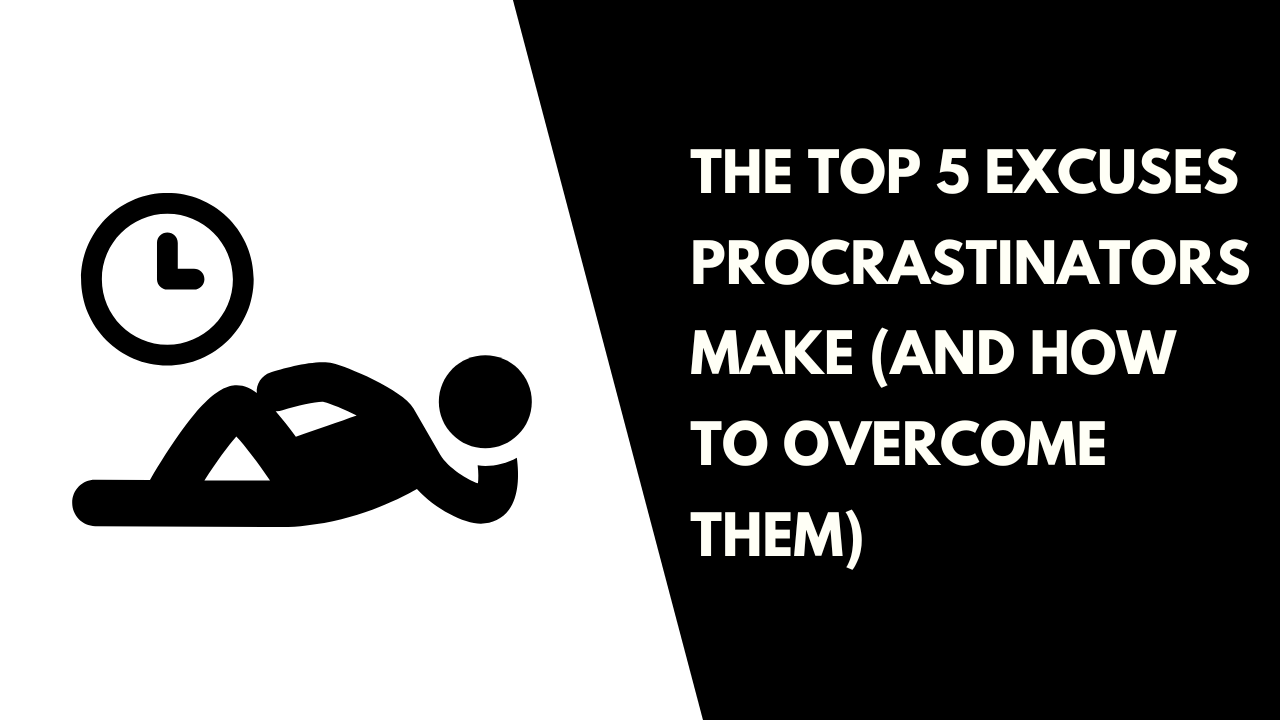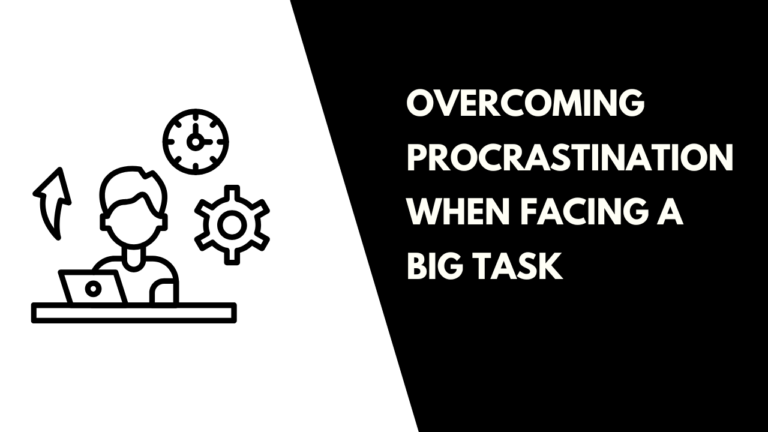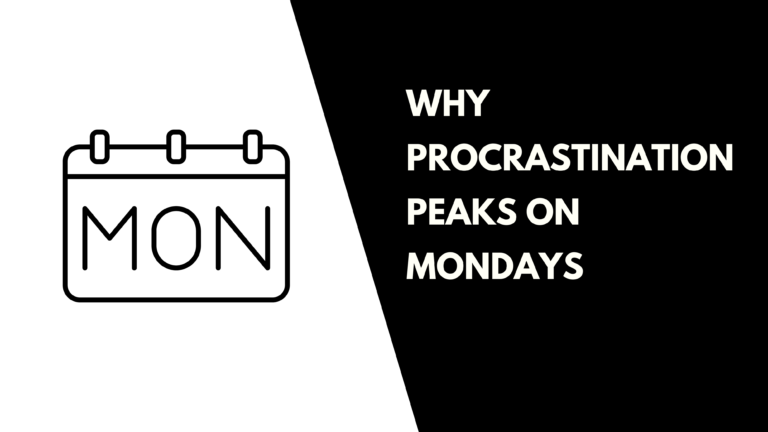The Top 5 Excuses Procrastinators Make (and How to Overcome Them)
Introduction –Top 5 Excuses Procrastinators Make
We’ve all been there—putting off tasks until the last minute, promising ourselves “tomorrow” will be different. While occasional delays are normal, chronic procrastination can hinder our progress and create unnecessary stress. At the core of procrastination are the excuses we tell ourselves. These excuses may seem valid at the moment, but they often mask deeper fears or habits. In this blog post, we’ll explore the top 5 excuses procrastinators make, uncover the reasons behind them, and share practical strategies to overcome each one.
Table of Contents
ToggleExcuse 1: “I Work Better Under Pressure”
This is one of the most common excuses procrastinators make. The idea of thriving on last-minute stress might sound empowering, but the reality often tells a different story. Tasks completed in a rush are prone to errors, lack creativity, and often fail to meet their full potential.
Real-Life Example:
Raj, a college student, always waited until the night before his assignments were due. While he managed to scrape by with decent grades, he often felt exhausted and dissatisfied with his work. When Raj finally decided to start working on tasks earlier, he noticed a dramatic improvement in his grades and gained extra time for revisions.
How to Overcome It:
- Break Tasks into Smaller Steps: Instead of waiting for a looming deadline, break the task into smaller, manageable parts and tackle them daily.
- Set Artificial Deadlines: Give yourself earlier due dates to reduce last-minute panic.
- Reward Yourself: Celebrate progress with small rewards for completing tasks ahead of schedule.
Excuse 2: “I’m Too Exhausted to Begin Right Now”
Fatigue is a powerful excuse procrastinators make. Whether it’s physical or mental exhaustion, the thought of starting a demanding task can feel overwhelming. While rest is essential, delaying tasks indefinitely can create a vicious cycle of stress and missed opportunities.
Real-Life Example:
Neha, a corporate employee, often postponed preparing for her presentations because she felt drained after work. However, this only increased her anxiety the night before, leading to sleepless nights and subpar performance. By setting aside 20 minutes daily after work, Neha started preparing gradually, reducing her stress and improving her confidence.
How to Overcome It:
- Use the 2-Minute Rule: Start with a small, two-minute version of the task to build momentum.
- Schedule Wisely: Plan to work on high-energy tasks when you feel most alert during the day.
- Incorporate Active Breaks: Engage in quick, energizing activities like stretching or a short walk to combat fatigue.
Excuse 3: “I Lack the Time to Start at the Moment”
“I’m too busy” is an excuse that convinces procrastinators to push tasks further down the priority list. However, this mindset often results in a pile-up of work that eventually feels insurmountable.
Real-Life Example:
Amit, an entrepreneur, delayed updating his company’s website because of his “packed” schedule. When he finally addressed it, he realized that completing the task took less time than anticipated. Amit regretted not starting sooner as the new website significantly improved his business’s visibility.
How to Overcome It:
- Time Blocking: Allocate specific time slots for tasks, treating them as unmissable appointments.
- Prioritize: Use the Eisenhower Matrix to focus on what’s urgent and important.
- Track Your Time: Use apps like Toggl or RescueTime to identify time-wasting activities and reclaim those hours.
Excuse 4: “I’m Waiting for the Perfect Mood or Burst of Inspiration”
Many procrastinators believe they need to feel motivated or inspired before starting a task. Unfortunately, this can lead to long delays since inspiration doesn’t always strike on demand.
Real-Life Example:
Rekha, an aspiring writer, kept putting off her dream of finishing her first book, waiting for the “perfect moment” to write. Months turned into years, and her manuscript remained untouched. Once she started writing for just 30 minutes daily, Rekha discovered that consistency, not mood, was the key to progress.
How to Overcome It:
- Create a Routine: Set aside a fixed time daily for the task, regardless of your mood.
- Start Imperfectly: Give yourself permission to create a rough draft or make mistakes—progress matters more than perfection.
- Inspiration Follows Action: Begin the task, and you’ll often find motivation building as you go.
Excuse 5: “I’m Afraid of Failing (or Succeeding)”
Fear, whether of failure or success, can paralyze progress. Procrastinators often avoid tasks because they’re worried about not meeting expectations or the changes success might bring.
Real-Life Example:
Sonia avoided applying for her dream job because she feared rejection. When she finally submitted her application after months of delay, she was not only accepted but praised for her unique qualifications. Sonia realized her fears had held her back unnecessarily.
How to Overcome It:
- Reframe Failure: View setbacks as opportunities to learn and grow.
- Visualize Success: Imagine the positive outcomes of completing the task.
- Seek Support: Share your fears with a trusted friend or mentor who can provide encouragement.
Final Thoughts
The excuses procrastinators make often feel convincing in the moment, but they are barriers to reaching our full potential. By identifying these excuses and implementing the strategies discussed, you can take control of your time and start living more productively.
Remember, procrastination is a habit—and like any habit, it can be changed with consistent effort. Begin with small steps, maintain consistency, and celebrate each milestone along the way.
“Stop postponing your dreams! From Delay to Done is your ultimate guide to conquering procrastination. Grab your copy today on Amazon!







